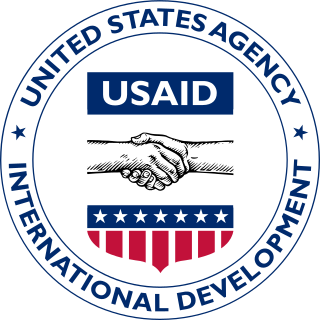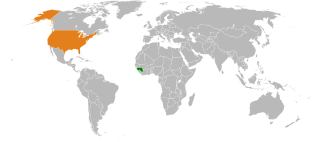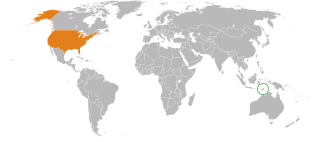
The United States Agency for International Development (USAID) is an independent agency of the United States government that is primarily responsible for administering civilian foreign aid and development assistance. With a budget of over $27 billion, USAID is one of the largest official aid agencies in the world and accounts for more than half of all U.S. foreign assistance—the highest in the world in absolute dollar terms.

The United States Senate Committee on Homeland Security and Governmental Affairs is the chief oversight committee of the United States Senate. It has jurisdiction over matters related to the Department of Homeland Security and other homeland security concerns, as well as the functioning of the government itself, including the National Archives, budget and accounting measures other than appropriations, the Census, the federal civil service, the affairs of the District of Columbia and the United States Postal Service. It was called the United States Senate Committee on Governmental Affairs before homeland security was added to its responsibilities in 2004. It serves as the Senate's chief investigative and oversight committee. Its chair is the only Senate committee chair who can issue subpoenas without a committee vote.

The United States House Committee on Foreign Affairs, also known as the House Foreign Affairs Committee, is a standing committee of the U.S. House of Representatives with jurisdiction over bills and investigations concerning the foreign affairs of the United States. Since 2023, the chair of the Foreign Affairs Committee has been Michael McCaul of Texas.
The Senate Foreign Relations Subcommittee on East Asia, The Pacific, and International Cybersecurity Policy is one of seven subcommittees of the Senate Foreign Relations Committee.

The Bureau of Legislative Affairs, also known as the "H Bureau", is the office of the United States Department of State that coordinates legislative activity for the Department of State and advises the Secretary, the Deputy, as well as the under secretaries and assistant secretaries on legislative strategy. The bureau facilitates communication between State Department officials and the Members of Congress and their staffs. The bureau works closely with authorizing, appropriations, and oversight committees of the House and Senate, as well as with individual members that have an interest in State Department or foreign policy issues. The bureau manages department testimony before House and Senate hearings, organizes member and staff briefings, and facilitates Congressional travel to overseas posts for members and staff throughout the year. The bureau reviews proposed legislation and coordinates Statements of Administration Policy on legislation affecting the conduct of U.S. foreign policy. The bureau staff advises individual bureaus of the department on legislative and outreach strategies and coordinates those strategies with the secretary's priorities.
The Senate Foreign Relations Subcommittee on Africa and Global Health Policy is one of seven subcommittees of the Senate Foreign Relations Committee.
The Australian Intelligence Community (AIC) and the National Intelligence Community (NIC) or National Security Community of the Australian Government are the collectives of statutory intelligence agencies, policy departments, and other government agencies concerned with protecting and advancing the national security and national interests of the Commonwealth of Australia. The intelligence and security agencies of the Australian Government have evolved since the Second World War and the Cold War and saw transformation and expansion during the Global War on Terrorism with military deployments in Afghanistan, Iraq and against ISIS in Syria. Key international and national security issues for the Australian Intelligence Community include terrorism and violent extremism, cybersecurity, transnational crime, the rise of China, and Pacific regional security.
The Senate Foreign Relations Subcommittee on Europe and Regional Security Cooperation is one of seven subcommittees of the Senate Foreign Relations Committee.
The U.S. Senate Environment and Public Works Subcommittee on Chemical Safety, Waste Management, Environmental Justice and Regulatory Oversight is one a subcommittee of the U.S. Senate Committee on Environment and Public Works.
The Senate Foreign Relations Subcommittee on Near East, South Asia, Central Asia, and Counterterrorism is one of seven subcommittees of the Senate Foreign Relations Committee.
The Senate Foreign Relations Subcommittee on Western Hemisphere, Transnational Crime, Civilian Security, Democracy, Human Rights, and Global Women's Issues is one of seven subcommittees of the Senate Foreign Relations Committee.
The Senate Foreign Relations Subcommittee on International Development, Multilateral Institutions, and International Economic, Energy and Environmental Policy is one of seven subcommittees of the Senate Foreign Relations Committee.
The House Way and Means Subcommittee on Trade is one of the six subcommittees within the House Ways and Means Committee

Guinea – United States relations are bilateral relations between Guinea and the United States.

East Timor–United States relations refer to the bilateral relations between East Timor and the United States.

The United States and North Macedonia enjoy excellent bilateral relations.

The United States established official relations with Nepal in 1947 and opened its Kathmandu embassy in 1959. Relations between the two countries have always been friendly. U.S. policy objectives toward Nepal center on helping Nepal build a "peaceful, prosperous, and democratic society."
United States Intelligence Community Oversight duties are shared by both the executive and legislative branches of the government. Oversight, in this case, is the supervision of intelligence agencies, and making them accountable for their actions. Generally oversight bodies look at the following general issues: following policymaker needs, the quality of analysis, operations, and legality of actions.

William John Garvelink is an American diplomat and former United States Ambassador to the Democratic Republic of the Congo appointed by George W. Bush on May 30, 2007, and sworn in on October 22, 2007.

Daniel Fitzgerald Runde is a senior executive and strategist in international development, international trade, investment, global business and organizational change. Runde is the author of the book, "The American Imperative: Reclaiming Global Leadership through Soft Power."









